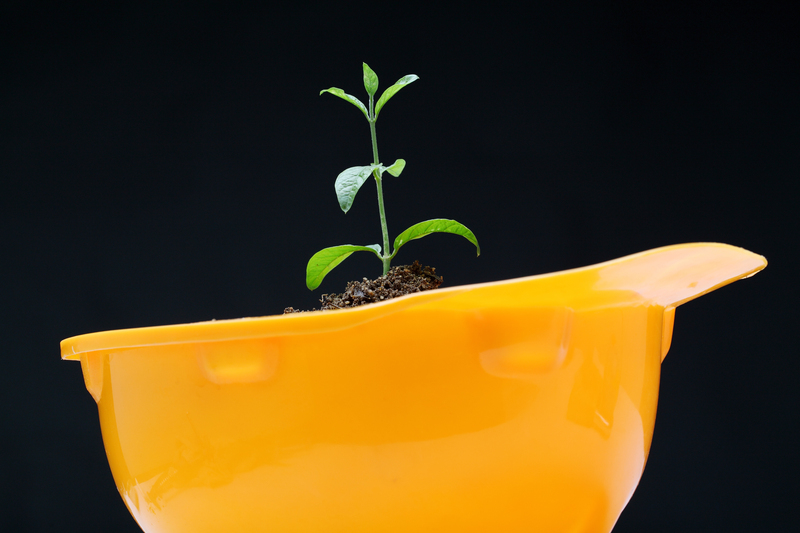Discover Innovative Ways to Breathe New Life Into Your Household Waste
Every household generates waste, but what if your household waste could find new purpose instead of piling up in the landfill? In today's eco-conscious world, finding creative ways to manage and repurpose garbage is not just responsible, but can also be fun and rewarding. Join us as we explore a variety of innovative methods to breathe new life into your household waste, from upcycling and recycling to ingenious DIY projects and composting secrets!
Why Reimagining Your Household Waste Matters
Every year, millions of tons of waste are produced by households globally. Unfortunately, much of this refuse ends up in landfill, producing harmful greenhouse gases and polluting the environment. Transforming your trash not only minimizes environmental impact, but also encourages sustainability, creativity, and cost savings. By learning to repurpose and recycle effectively, you help cultivate a cleaner, greener planet for generations to come.
- Environmental Preservation: Reducing, reusing, and recycling waste protects natural resources.
- Cost Savings: Household items can be reused rather than repurchased.
- Innovation: Repurposing garbage fosters creativity and resourcefulness.
- Health Benefits: Less waste means less pollution and a healthier living environment.

Top Innovative Ways to Repurpose Household Waste
1. Upcycling: Giving Trash a Trendy Transformation
Upcycling is the art of transforming waste materials into products of higher value or quality. Unlike recycling, where materials are broken down to make new items, upcycling focuses on creative reuse with minimal processing. Here are some effective upcycling ideas for common household waste:
- Glass Jars: Decorate and reuse as storage containers, planters, or candle holders.
- Cardboard Boxes: Turn them into drawer organizers, magazine racks, or creative kids' crafts.
- Old Clothing: Repurpose t-shirts into cleaning rags, tote bags, or even patchwork quilts.
- Plastic Bottles: Cut and craft into bird feeders, plant pots, or self-watering planters.
- Wine Corks: Assemble into coasters, notice boards, or unique jewelry.
Tip: Gather the family for a creative upcycling afternoon and watch your waste transform into useful household treasures!
2. Smart Recycling: Maximize What You Can Reclaim
Recycling is crucial for reducing landfill but proper recycling habits ensure your items are actually processed. Here's how to improve your household recycling:
- Sort waste correctly: Separate plastics, glass, paper, and metals as preferable by your local recycling program.
- Clean before recycling: Rinse out containers to prevent contamination in recycling centers.
- Know what's recyclable: Some plastics, such as polystyrene, aren't commonly accepted. Check your local guidelines.
- Drop-off points: Collect batteries, electronics, and hazardous waste for designated drop-off centers.
Remember, "Wish-cycling"--putting non-recyclable items into the bin--can spoil entire recycling batches. Stay informed for maximum impact!
3. Composting: Turn Kitchen Scraps Into Garden Gold
If you're looking to breathe new life into organic household waste, composting is one of the best ways. Composting transforms kitchen scraps and yard waste into nutrient-rich soil, reducing landfill garbage and enhancing your garden's productivity.
- What to compost: Fruit and vegetable scraps, coffee grounds, eggshells, grass clippings, leaves.
- What to avoid: Meat, dairy, oils, diseased plants, and pet waste.
- Get started: Use a small kitchen compost bin and transfer to a compost heap or a closed compost tumbler outdoors.
- Add balance: Mix "greens" (wet, nitrogen-rich) and "browns" (dry, carbon-rich) for effective decomposition.
Expert Tip: Compost can save you money on fertilizers and improve soil structure for your plants!
4. Creative DIY Projects: Turn Trash Into Home Decor
Ready to showcase your creativity? Home decor doesn't have to be expensive--with some imagination, you can repurpose household rubbish into stunning decorations and functional items:
- Pallet Furniture: Reclaim wooden pallets for coffee tables, plant stands, and storage units.
- Bottle Lamps: Convert glass bottles into chic DIY lamps or light fixtures.
- Magazine Art: Roll and glue pages of old magazines to create wall art or decorative bowls.
- Tin Can Planters: Paint empty cans to use as vibrant plant pots or utensil holders.
- CD Mosaic Mirrors: Break unused CDs for use in sparkling, eye-catching mosaics on mirrors or frames.
By transforming trash into conversation pieces, you reduce waste and add unique flair to your living space!
5. Reduce and Reuse Strategies: Minimize Waste Generation
The most impactful way to tackle household waste is to reduce it at the source. Here are practical habits to embrace:
- Bulk Buying: Purchase items in larger quantities to cut down on packaging waste.
- Reusable Containers: Swap single-use plastics for glass or stainless-steel containers and water bottles.
- Refill Stations: Take advantage of local stores offering refills for cleaning supplies or pantry staples.
- Repair Don't Replace: Fix broken appliances, clothes, or furniture before buying new ones.
- Borrow or Swap: Use community sharing programs for tools, equipment, or books.
Did You Know? Every little action to reduce or reuse can significantly lower your household's overall waste output.
Household Waste Repurposing: Specialized Approaches for Common Items
Upcycled Electronics and E-Waste
Modern households accumulate electronic waste rapidly, from outdated smartphones to broken chargers. Instead of discarding, explore these alternatives:
- Donate: Working electronics can be donated to local charities, schools, or shelters.
- DIY Projects: Use circuit boards, old screens, and wires in creative tech art or educational models.
- Parts Recovery: Salvage parts like switches, LEDs, and connectors for future repairs or inventions.
- Certified Recycling: Use e-waste recycling centers that safely handle valuable and hazardous materials.
Repurposing Food Waste Beyond Composting
While composting is best, some kitchen scraps can be reused in innovative ways:
- Citrus Peels: Dry and use in potpourri, homemade cleaners, or candy them for sweet treats.
- Coffee Grounds: Exfoliate skin, deodorize refrigerators, or supplement garden soil.
- Vegetable Ends: Save for homemade broths before composting.
- Regrow Veggies: Place green onion roots, lettuce bases, or potato eyes in water and watch them sprout anew!
Transforming Packaging Waste
Household packaging waste like plastic bags, bubble wrap, and cardboard often accumulates fast. Here's how to handle them:
- Plastic Bags: Weave into sturdy baskets, mats, or even crochet into reusable shopping totes.
- Bubble Wrap: Cushion fragile items during storage or shipping or use as a fun sensory play material for children.
- Cardboard: Repurpose for crafts, garden mulch, or as seedling starters in the garden bed.
Benefits of Breathing New Life Into Household Waste
- Eco-Friendly Living: Less waste to landfill results in reduced pollution and resource depletion.
- Financial Perks: Saving on household goods and DIY repairs adds up over time.
- Creative Fulfillment: Crafting, building, and customizing objects sparks imagination and joy.
- Community Engagement: Share upcycled creations or skills with neighbors, friends, and local groups.
- Self-Sufficiency: Learning to repurpose everyday rubbish fosters independence and adaptability.
Engage the Entire Family in Household Waste Repurposing
Turning household waste into valuable resources can be a fantastic family activity. Here's how to get everyone involved:
- Start a Challenge: See who can come up with the most creative use for an item normally thrown away.
- Host a Swap Day: Exchange old clothes, books, or toys with friends or family instead of discarding.
- Educational Moments: Teach children about the importance of sustainability, conservation, and eco-awareness.
- Create Together: Set up a DIY craft session each week focused on reusing specific types of waste.
Resources and Inspiration for Repurposing Household Waste
- Online Tutorials: YouTube and Pinterest overflow with step-by-step upcycling projects and recycling tips.
- Local Makerspaces: Community workshops often run events on repairing and transforming waste materials.
- Books: Look for guides on zero waste living, upcycling ideas, and sustainable crafting.
- Apps: Waste-tracking and recycling apps help you manage, sort, and dispose of items responsibly.

Conclusion: Embrace Innovation and Sustainability
Giving new life to your household waste is a powerful way to minimize your environmental impact and unleash your creativity. From sophisticated upcycled furniture to clever kitchen composting, the possibilities are truly endless! Start small--pick one or two practices from this article and incorporate them into your routine. Before you know it, what was once trash will become valuable, functional, or beautiful additions to your home and garden.
Take the first step today and transform your trash into treasure--you'll be amazed at what you (and your household waste) can achieve!
Let's inspire our communities and future generations by choosing innovative, sustainable, and fun approaches to household waste management.
FAQs on Innovative Household Waste Repurposing
- What household items are easiest to repurpose?
Mason jars, old t-shirts, cardboard boxes, and plastic bottles are among the simplest to transform with DIY techniques. - Is upcycling the same as recycling?
No. While both aim to reduce waste, upcycling creatively reuses items without breaking them down, whereas recycling involves processing and remanufacturing materials. - Can household waste be profitable?
Yes! Many people start businesses or side hustles from upcycled products or art, and you can also save money by reusing and repairing. - What is the first step for beginners?
Begin by sorting waste at home and researching simple upcycling and composting projects suited to your needs.
Ready to start breathing new life into your household waste? Share your own innovative ideas and inspire others to join the movement towards a cleaner, greener world!